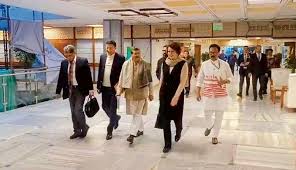NEW DELHI: From seeking to know the economic viability of holding simultaneous elections to questioning the “real motive” behind the move, Congress MP Priyanka Gandhi Vadra and other opposition members on Wednesday posed several queries during the inaugural meeting of the joint parliamentary panel on the One Nation, One Election (ONOE) Bill. Ruling BJP members termed the proposed legislations on the ONOE “pathbreaking”.
The meeting of the joint committee on the Constitution (129th Amendment) Bill, 2024, and the Union Territories Laws (Amendment) Bill, 2024, which is headed by BJP MP PP Chaudhary, witnessed animated discussions with the Secretary (Legislative) giving a detailed presentation on the circumstances which led to the introduction of the proposed legislations.
Sources aware of the deliberations said the “context and contents” of the two Bills were explained by officials of the Law and Justice Ministry through presentations.
Vadra, the Congress MP from Wayanad who is a member of the joint panel, sought to know the economic viability of holding simultaneous elections and also the number of EVMs needed for the purpose.
Trinamool Congress member Kalyan Banerjee wondered whether the necessary infrastructure was ready for holding simultaneous elections. He asked whether the real motive behind the move was to reduce expenses or to harm the basic fabric of democracy.
“People have a right to vote after every five years in the municipal, Assembly and General Election; why is the government trying to snatch this right from them,” he asked officials of the Law Ministry during the meeting.
Another opposition member from the Rajya Sabha said the recommendations of the high-level committee on simultaneous elections headed by former President Ram Nath Kovind, on the basis of which the two Bills were introduced in Parliament, were not acceptable.
The committee headed by Kovind was constituted by the Centre on September 2, 2023. Its primary objective was to explore the feasibility of conducting simultaneous elections for the Lok Sabha and the state assemblies.
The panel had spoken to 47 parties and taken their opinion on the ONOE, with 32 of them supporting it and 15 opposing it.
Meanwhile, another opposition MP expressed apprehensions that the ONOE could violate the basic structure of the Constitution upheld by the Supreme Court in the 1973 Kesavananda Bharati case. In this significant judgment, the apex court had ruled that while Parliament had the power to amend the Constitution, it could not alter its basic structure, the fundamental features of which were democracy, secularism, federalism and the rule of law. The BJP MPs reiterated that a continuous cycle of elections hampered the country’s development and was a drain on the exchequer. The proposed legislations, they claimed, would help boost growth and development.
The Shiv Sena, which was represented by Shrikant Shinde, cited the case of Maharashtra where the Lok Sabha, Assembly and local body elections were held within a few months, stressing that this derailed development work as the entire state machinery was busy in the conduct of the elections.
The parliamentary committee, comprising 39 members, is examining two Bills — the Constitution (129th Amendment) Bill and the Union Territories Laws (Amendment) Bill. The pieces of legislation were introduced in the Lok Sabha during the winter session and then referred to the panel.
The panel has 27 Lok Sabha MPs and 12 Rajya Sabha MPs. The prominent names include BJP’s Anurag Singh Thakur, Bhartruhari Mahtab and Sambit Patra, Congress’ Priyanka Gandhi Vadra and Manish Tewari, Trinamool Congress’ Kalyan Banerjee and NCP (Sharad Pawar) leader Supriya Sule.
The Congress and other opposition parties have said the proposal for simultaneous elections subverts the basic structure of the Constitution.


